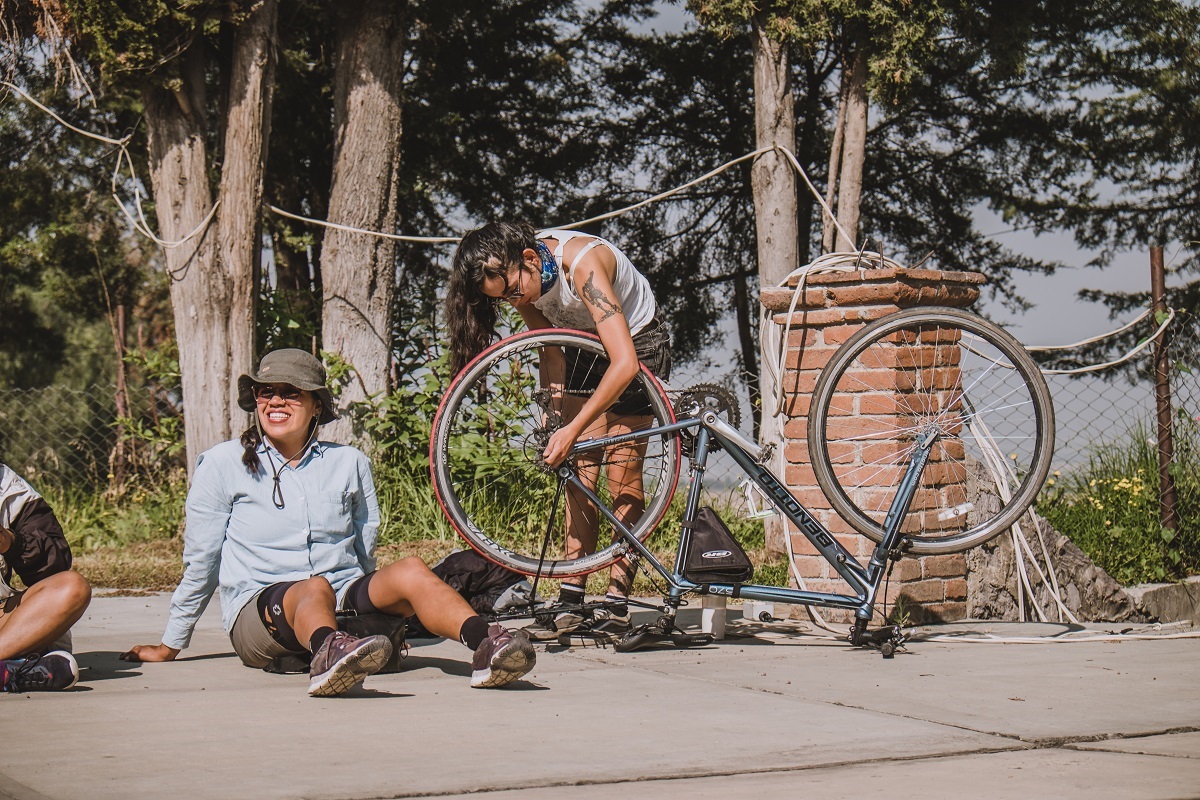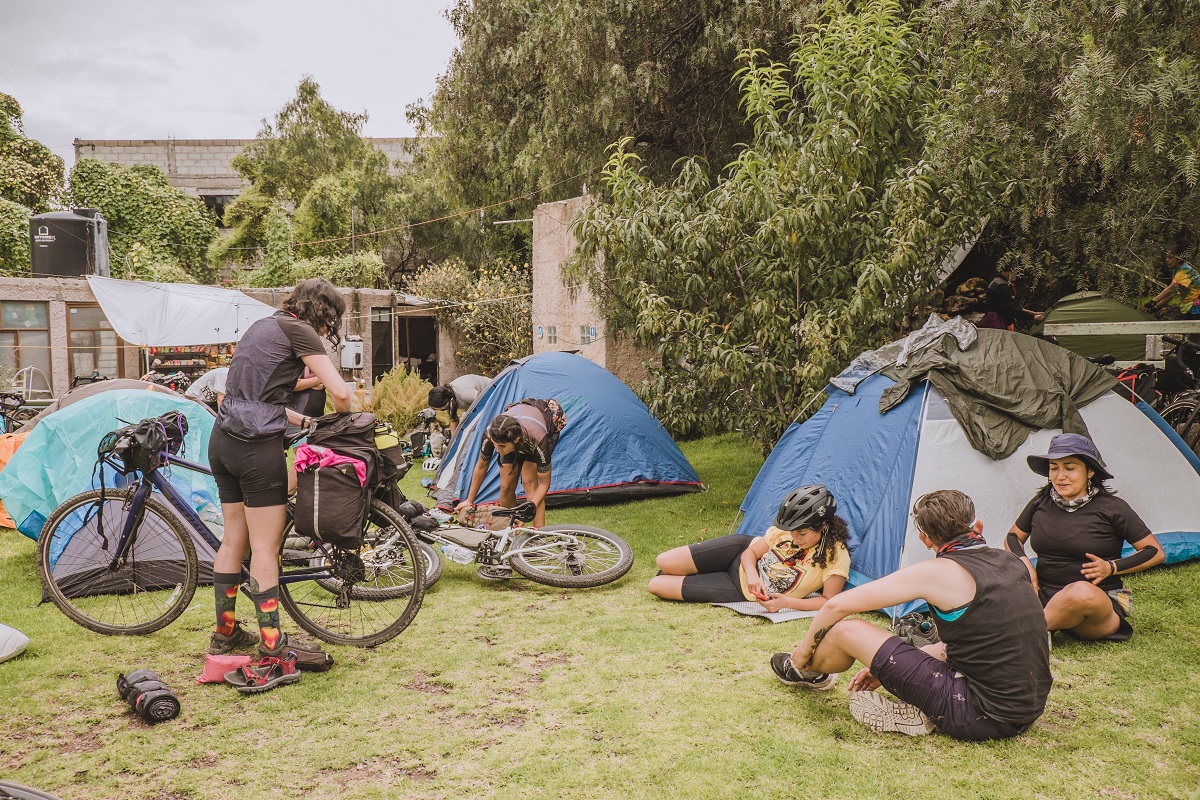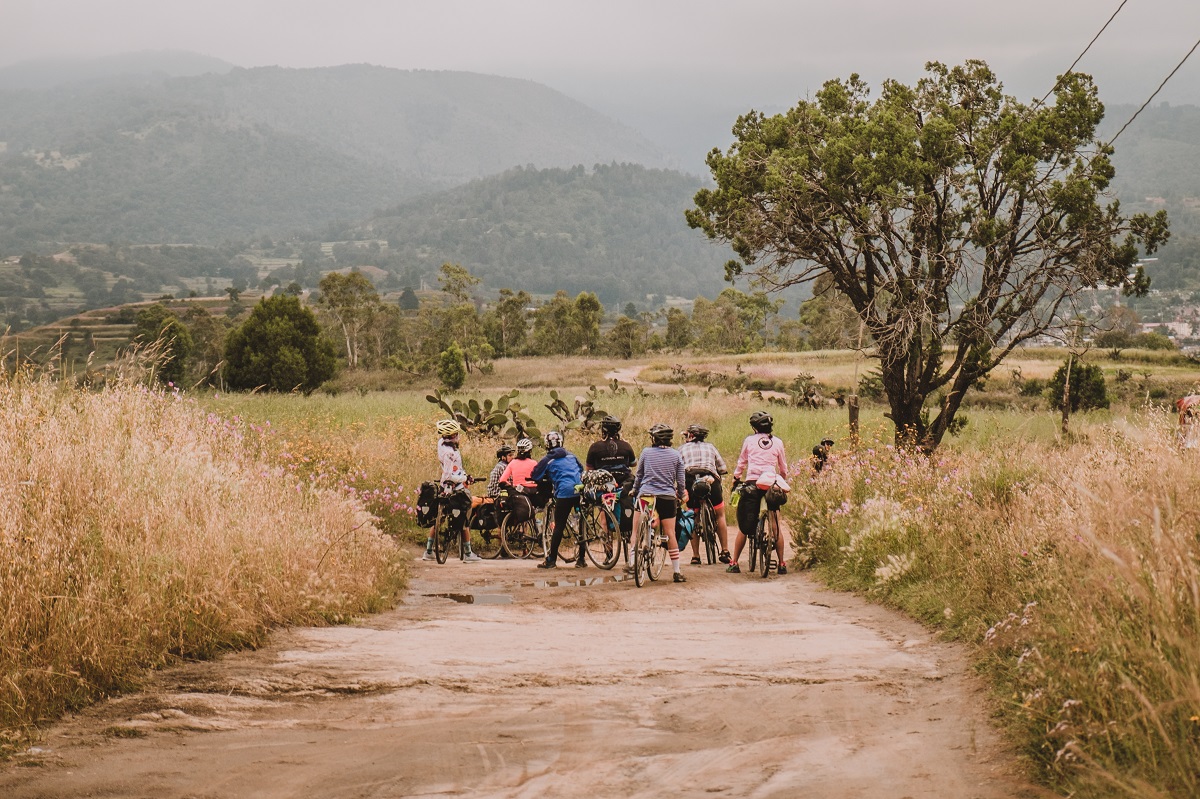Traveling as La Serpiente Emplumada
“I like cycling because it’s the way you take your feet off the ground and keep walking” –Oli
Loose racks, fallen luggage, bags rubbing on tires, and tubes going flat: these were some of the scenes from our first bikepacking event for women, transgender, and non-binary people in Mexico. Less-than-fun things often happen on a first bike trip, but for us every trial became a beautiful experience in kindness as a willingness to help each other, even though we were strangers, emerged. The thing I remember most about leading my first Bike Overnight was an unmatched energy of empathy, companionship, and mutual help.
Before the trip, my nerves flew. I had never led such a large group, and some people had never gone on a bicycle trip. I could feel the weight of responsibility creeping over me.
Looking for help, I reached out to Adventure Cycling’s Bike Overnights program, which supports local ride leaders. I sat in on their webinar on “Planning and Leading a Bike Overnight,” where I was reassured by people who had done exactly what I was attempting to do. Whatever happened, the trip would be a contribution for the cycling community in Mexico.

My self-contained route was a three-day, 120-mile loop around Mexico City. It was 40 percent off-road and 60 percent pavement with some bike lanes and interstate freeways. Mexico City is one of the biggest cities in the world. It sits a tall 7,217 feet above sea level and has large natural spaces with big pines, oaks, and a diversity of flora and fauna. My friends pointed out that the route would pass through important archeological and natural areas, such as the Cerro del Tetzcotzinco and the Pirámides de Teotihuacán.
On departure day, 35 souls full of joy and motivation pedaled off together. My heart was full and a smile spread across my face. As we moved through the city, it was interesting to see the expressions of amazement, curiosity, and surprise in the faces of pedestrians we passed by.
Sometimes they asked us what we were, where we were coming from, as if we were species from another planet. At intersections, my new friends would use their bodies to stop the traffic so that the rest of us could pass. My smile got bigger and bigger.
A gravel road led us to the Cerro del Tetzcotzinco, a sacred place for the Méxhicah culture, where we found the Pyramids of Teotihuacán and endless quesadillas, tlacoyos, and pulque, a traditional Mexican drink. At night, we shared food, stories, things we learned, and lots of laughter.
One of the riders, Gabi, is an anthropologist. Her bicycle caught my attention: a Benotto Rush 26in. with full suspension that her mother gave her when she was 11 years old. She bought it large so that it would fit her for a few years, not knowing that that same bike would take her daughter on her first cycling and camping adventure.
Gabi carried her gear on a steel front rack in a large backpack covered with a black plastic bag to make it waterproof, tying it to the rack with old tubes. She hung the tent on the seat and secured it with some raffia, and when she pedaled, the tent touched her legs. I stopped once to ask her if she was alright but, smiling, she told me it didn’t bother her. I would learn that Gabi had a fascinating way of seeing the world, characterized chiefly by patience and a big heart.

On the last night, we danced around the fire, knowing that this would not be the last time we would share roads and routes. The rain came and put out our fire but we stayed up late into the night. When the rain began to pour, we took refuge in our tents. Some discovered that water had filtered in and soaked everything, so they sought asylum with others. Gabi housed four people in a one-person tent that had only black plastic bags held together with scotch tape as a rain fly!
The next morning announcements from a loudspeaker woke us at 6:00 AM. We were unaware that right next to the campsite was a launchpad for hot air balloons preparing for flight.
A friendly voice called, “Sir, please shut up, we want to sleep.” It made me laugh so much that I decided to leave my tent to see what was happening. It was a wonderful show: hot air balloons about to take off against the morning sunrise. We started the fire and enjoyed breakfast and coffee.
When we packed our tents and bikes, an attendee named Leslie came over and told me with an empowered grin on her face that it was the first time she’d packed her bike by herself.
I asked for a photo of each person next to a statue of the head of Quetzalcoatl, which was in the camp. Quetzalcoatl was one of the most important deities for the Méxhicah civilization and other Mesoamerican cultures; it’s also known as La Serpiente Emplumada. The name comes from the words Quetzal, a bird, and Coatl, a snake in the Náhuatl language.
Quetzalcoatl is the god of physical and spiritual strength, represented with the body of a snake to symbolize strength in humans and also to show association with the land. The feathers around his head represent the spiritual principles of knowledge, culture, and the creation of the world, sky, and wind.

I believe that traveling by bicycle is much more than just traveling. For me it’s part of a philosophy of freedom, discovering the world and myself, making a truce with the wind, respecting the land that you are riding. I travel as a Serpiente Emplumada.
We took the “Ghost Highway,” back to the city, an abandoned construction project of the new Texcoco airport. The owners of the land the highway was supposed to pass through didn’t want to sell, so the construction had to stop, leaving at least 20 kilometers of abandoned road, now a training ground for local cyclists.
Returning to the city, we said goodbye one by one as people split off toward their final destinations. I was very close to reaching my own endpoint when my chain broke. Some friends stayed to help me, and we were able to cut two links and put it back together to get me home.
I took it as a sign to say goodbye to this trip, while also waving hello to the next one. After the trip, the new group of adventure cyclists agreed to make this an annual event in different regions of Mexico. Maybe you’ll want to join us next year.


